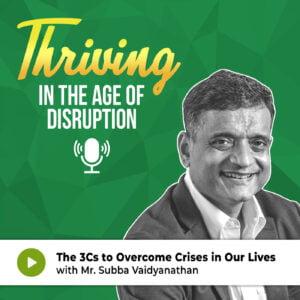DR. RAMESH RAMACHANDRA


BUSINESS GROWTH STRATEGIST
How crisis is largely defined by your perception of the situation.
You can use this knowledge to turn the tides into alignment with yourself instead.

- Usually, a crisis is not as threatening as we make it out to be.
- Our mindset or frame of mind can change the entire situation into one that works for us.
- If we cannot change how we feel, there is still our resolve to help us power through.
There is a German proverb that goes, “Fear makes the wolf bigger than he is”. When something earth-shattering occurs, we usually panic as part of a natural reaction. Yet, how much of the fear response is truly befitting of the situation? As humans, we are blessed with the power of imagination and foresight, but this can easily become a curse if not mindfully managed. For instance, we could be overthinking the issue totally out of proportion. Perhaps it’s worth taking a step back sometimes and reflecting on whether we are making mountains out of molehills.
Before we dissect this phenomenon, I’d like to talk a bit about perception. Perception is the lens that we see the world through and varies greatly from person to person. Two people that witness the same spectacle could report varying accounts, or be impacted differently. Its arbitrary nature can cause individuals to interpret an event as negative or positive regardless of the general consensus, and even this is very vulnerable to change.
Why is this so? We can trace back and find that the answer lies in how perception is formed in the first place. For most people, the foundations are steeped in the culture and beliefs of their community and authority or parental figures. These values would usually be ingrained at an early age, before they even develop reasoning or a deeper awareness. It is through these initial guidelines that a little child uses, like tools, to navigate and make sense of their otherwise strange and foreign environment. An inner compass and frame of understanding begins to develop which is used to process new information, fitting it into an existing ecosystem of data.
We can see how this creates a learning loop where consciousness, i.e. self-awareness, keeps snowballing as it is being exposed to more stimuli. While growing, the various layers are always dependent on what came before it, thus there is only subjective depiction, no objective, set-in-stone truths in this area of discussion.
"While self-awareness might be altered later on in life due to changes in personal development, it still serves as a backdrop for the way a person’s mind works."
So, I know it’s all up to how I want to see the situation, but if I can’t help but feel scared, what do I do next?
"Find out more about how to take charge"
Share a situation where you have changed your perception of a setback and thus managed to recover and get back on track!

- WRITTEN BY
Founder – Talent Leadership Crucible
Author – The Big Jump into Entrepreneurship
Podcaster – Thriving in the Age of Disruption



